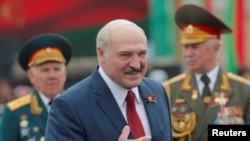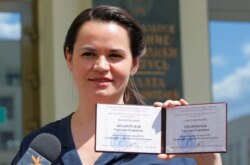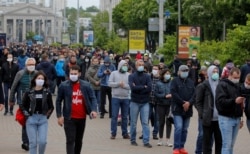In a winding state of the nation speech before lawmakers on Tuesday, Belarusian leader Alexander Lukashenko warned that political enemies at home and abroad were planning violence ahead of the country’s upcoming presidential elections — and vowed his government would not tolerate a street revolution.
“So far there is no open warfare, no shooting, the trigger has not yet been pulled. But an attempt to organize a massacre in the center of Minsk is already obvious,” said Lukashenko, 65, the only president Belarusians have known ever since the nation of 9.5 million gained independence following the breakup of the Soviet Union.
Lukashenko’s speech came just days before a Sunday vote that looks to be the most serious challenge to a more than quarter century rule that has earned the Belarusian leader the undesirable nickname “the last dictator of Europe.”
Now seeking a sixth straight term in office, the Belarusian leader has run into an unexpectedly strong opponent in Svetlana Tikhanovskaya, a political novice who stepped in as a placeholder candidate after authorities arrested her husband — the political blogger Sergei Tikhanovsky — on trumped up charges she says were intended to keep him out of the election.
Backed by the wives of other male would-be challengers banned from the race, Tikhanovskaya has drawn huge crowds in speeches across the country — a fact that Lukashenko mocked in his speech before a grim unsmiling audience of loyalists who broke out into occasional applause.
“They found those three unhappy girls. They don’t even understand what they’re reading, what they’ve written for them,” said Lukashenko, who added the women were controlled by “puppet masters” abroad without elaborating.
Moscow’s hand
Adding another layer of uncertainty in the elections are Belarus’ increasingly strained relations with its larger neighbor, Russia.
“Russia has always been and will always be our close ally irrespective of who takes power in Belarus or Russia,” assured Lukashenko.
Yet Lukashenko said the relationship had shifted from “brotherly” to “partner-like” as Belarus has chafed with Russia over issues such as gas politics, Lukashenko's response to the coronavirus, and a long-stalled plan to create a joint union with Belarus as the lesser partner.
“Russia fears losing us because it has no really close allies left except us,” said Lukashenko, while noting that the “West has shown increasing interest.”
A more immediate irritant has been the arrest of 33 alleged Russian mercenaries by Belarus security agents during a raid of a resort compound outside the capital last week.
Minsk has since charged the Russians with working with Lukashenko’s political opponents to launch “terrorist acts” and destabilize the country ahead of the vote.
“These people gave testimony that they were sent specially to Belarus. Their orders were to wait,” said Lukashenko.
Russia argues the men were in Belarus after missing a flight to Turkey — an explanation Lukashenko labeled as a patent “lie” and “legend.”
Lukashenko also claimed additional Russian mercenaries were still operating on Belarusian soil.
“Today we heard of another unit sent into the south,” said Lukashenko. “We will have to run through the forests to catch them but we will get them all,”
Critics argue the timing of the plot suggested the Belarusian leader was desperate to create a pretext for a crackdown against political opponents out of fear of losing the election.
Speculation has also centered on Moscow’s role and whether it had helped stage the standoff or truly been caught off guard by the detentions.
On Tuesday, Russian Foreign Ministry spokeswoman Maria Zakharova called Lukashenko’s latest accusations “a theater performance” — adding Belarusian authorities had provided no evidence of the detained Russians’ guilt.
The threat of violence
Indeed, for weeks, the Belarusian leader has suggested dark forces were at play ahead of the election.
Hundreds of supporters of opposition candidates have faced arrest. Journalists have been detained. Campaign staffers and advisors have been thrown in prison.
Human rights groups have condemned what they say is an oppressive state trying to determine the outcome of elections that international observers say are neither free nor fair.
Following Lukashenko’s speech there were reports of dozens of detentions by state security forces at scheduled rallies.
But Valery Tspekalo, a would-be challenger to the Belarusian leader who was barred from participation in the race, said winning what was essentially a fixed election was not the point of the race.
If fellow citizens could not have their votes counted by Lukashenko’s government, suggested Tspekalo, then at least they could have their voices heard.
“If we have some 20,000 people going out [to protest] on election day, then it is possible that the resources he has at his disposal — by which I mean the Interior Ministry — will be sufficient to disperse the crowd,” said Tspekalo in an interview with "Current Time", a partner project of VOA and Radio Free Europe/Radio Liberty.
“But if we have 100,000 people out,” Tspekalo said, “Lukashenko will simply board a plane and fly away somewhere.”








